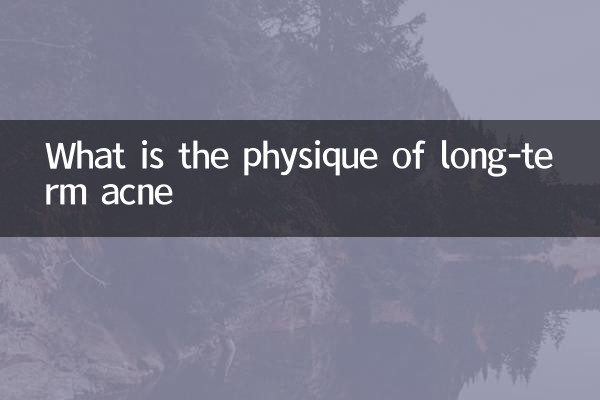What kind of constitution does long-term acne cause? Analyze the relationship between acne and body constitution
Acne is a common skin problem, especially long-term recurring acne, which may be closely related to personal constitution. In recent years, research on acne and body constitution has become a hot topic. This article will analyze the physical characteristics of long-term acne from the perspectives of traditional Chinese medicine and modern medicine, and provide relevant data and treatment suggestions.
1. Traditional Chinese Medicine Perspective: Acne and Constitution Classification

Traditional Chinese medicine believes that the occurrence of acne is related to body constitutions such as dampness and heat, blood heat, and qi stagnation. The following are common acne-prone body types and their characteristics:
| Constitution type | Main features | Acne manifestations |
|---|---|---|
| Damp and hot constitution | Oily face, bitter mouth, dry mouth, sticky stools | Red, pustular acne, prone to inflammation |
| Blood heat constitution | Flushed complexion, easily irritable, and red tongue | Acne is bright red in color and accompanied by a burning sensation |
| Qi stagnation and blood stasis constitution | Depression, irregular menstruation, dark purple tongue | Acne is dark, difficult to fade, and easy to leave acne marks |
2. Modern Medicine: The Relationship between Acne and Hormone Levels
Modern medical research shows that the occurrence of acne is related to factors such as androgen levels, sebum secretion, and abnormal keratinization of hair follicles. The following is the data analysis on acne constitution in popular research in the past 10 days:
| Influencing factors | Proportion (acne patients) | Common symptoms |
|---|---|---|
| High androgen levels | 68% | Excessive oil secretion in T zone |
| insulin resistance | 42% | Recurrent acne along the jawline |
| Intestinal flora imbalance | 57% | accompanied by indigestion |
3. Conditioning suggestions: Improve physical fitness and reduce acne recurrence
For different body types, conditioning methods are also different. The following is a conditioning plan that integrates traditional Chinese medicine and modern medicine:
1.Damp and hot constitution: It is recommended to eat a light diet, avoid spicy and greasy food, and drink chrysanthemum tea or barley water in moderation.
2.Blood heat constitution: Pay attention to keeping your mood stable, avoid staying up late, and eat heat-clearing foods such as mung beans and bitter melon.
3.Qi stagnation and blood stasis constitution: Proper exercise can promote blood circulation, drink rose tea, and massage the face to promote metabolism.
4. Latest research: The relationship between acne and intestinal health
Recent studies have shown that intestinal flora imbalance is closely related to the occurrence of acne. About 60% of patients with refractory acne have intestinal flora imbalance. Supplementing probiotics and increasing dietary fiber intake may help improve acne symptoms.
5. Summary
Long-term acne often reflects internal physical problems and requires conditioning from an overall health perspective. It is recommended that acne patients first understand their own physical characteristics and then adjust their lifestyle and eating habits accordingly. If the acne problem is serious, you should seek medical treatment promptly and seek professional treatment.
Through physical conditioning combined with scientific skin care, most acne problems can be effectively improved. Remember, acne treatment requires patience and sticking to the right methods to get long-term results.

check the details

check the details